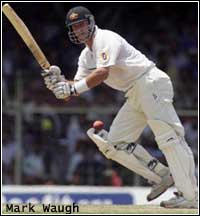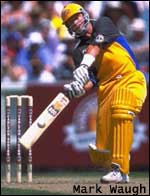The indelible Mark
Daniel Laidlaw
Mark Waugh is nothing if not a survivor. Bookmaker scandals, form slumps,
media vendettas -- the junior Waugh has sailed through them all with the same
serene demeanour, at least on the field. Most frequently described as
'elegant' or 'laconic', Waugh's hold on his place in the Australian team has
frequently appeared tenuous. But like the energizer bunny from the
commercial, he keeps on keeping on, playing more matches for his country
than any other during the past few seasons due to his role in both forms of
the game and an absence of injuries. No longer in his prime, Waugh scores
enough runs to save himself and at the same time assist his country,
although frustratingly not with the consistency he or his supporters would
have envisioned by this stage of his career.
 Several years ago, Waugh, with a Test average of 45, claimed it was his
intention to improve that average to 50. Instead, it has gone the other way.
Nevertheless, he remains a classy performer, particularly in the one-day
game, for which is not given enough credit. Waugh is Australia's greatest
one-day cricketer.
Several years ago, Waugh, with a Test average of 45, claimed it was his
intention to improve that average to 50. Instead, it has gone the other way.
Nevertheless, he remains a classy performer, particularly in the one-day
game, for which is not given enough credit. Waugh is Australia's greatest
one-day cricketer.
In comparisons with his brother Steve, Mark often fails to match up. But in
one-day cricket, he stands alone. His century in the second match in Pune
was his 18th, double that of the nearest Australian, Geoff Marsh. Waugh's
8245 runs, in 232 matches at an average of 40.02, place him 1138 ahead of
second place - Steve Waugh.
It is a testament to his longevity more than anything else, since he has the
natural advantage of being an opener. One-day matches are now designed for
opening batsmen to flay the ball around the ground. Openers invariably have
the best records because they bat under ideal conditions. Even in that
context, Waugh's record is a good one.
After a lean period, 2001 is turning out to be one of Waugh's best years in
coloured clothes. He hasn't exactly scored runs in pressure situations, with
three of his tons coming in the home tournament against West Indies and
Zimbabwe, but his most recent effort in Pune already gives him four hundreds
for the calendar year. The innings of 133 was also his second-best, after
the 173 he scored against West Indies in February.
Unusually for Waugh, he was flustered in the field in the Pune match.
Nothing went right for him. He was struck on the fingers, grazed his elbows,
and was hit for 22 runs from his 3 overs. And showed his frustration. It did
not, however, stop him from taking one of his trademark easy catches. That
is, easy in appearance only. Some players have a habit of making
straightforward catches look spectacular by throwing themselves around.
Waugh is just the opposite. He snares the most difficult with minimal
movement, diving only when he has to. The skied catch he held off Joshi was
eminently droppable... but Waugh adjusted his hands late, safe as always.
These incidents stick in the memory more than the hundred itself. He's
played similar innings before and will do so again. Perhaps the feature of
it, in conjunction with Hayden, was that he made it appear a different
match. India's total should have been challenging, but Waugh made it look
inadequate.
 The partnership with Hayden could eventually prove significant. It is
unknown whether Australia plan to persist with the Waugh-Hayden union or if
it is only a temporary solution. The Waugh-Gilchrist combination had been
highly successful. It seems as though it was broken up to accommodate
Hayden, perhaps with an eye to the 2003 World Cup in South Africa where
seaming pitches may require the technique of a genuine opener. Whatever the
case, Waugh remains the constant, settling in comfortably with his new
partner after a bad shot in Bangalore.
The partnership with Hayden could eventually prove significant. It is
unknown whether Australia plan to persist with the Waugh-Hayden union or if
it is only a temporary solution. The Waugh-Gilchrist combination had been
highly successful. It seems as though it was broken up to accommodate
Hayden, perhaps with an eye to the 2003 World Cup in South Africa where
seaming pitches may require the technique of a genuine opener. Whatever the
case, Waugh remains the constant, settling in comfortably with his new
partner after a bad shot in Bangalore.
In ODIs, Waugh is the key Australian wicket, or at least he had been until
Hayden's recent revival. In the past, as Waugh fared, so did Australia's
batting. Now Australia has the depth to recover from early setbacks, but it
remains true that when Waugh scores a hundred, Australia wins.
Just when Waugh appears headed for further scrutiny over his position, he
does something to hold off the most severe criticism. His twin
half-centuries in the third Test masked another ordinary series. At times it
seems like the best part about his game is his catching. Yet at the end of a
series, he always does something to win back favour. When the Ashes begin,
Waugh will be in his customary No. 4 slot, ready for another shot at
redemption.
Greg Chappell made a bet during the 1993 Ashes tour that Waugh would score
20 Test centuries. Sometimes it has seemed like he would not make it; now he
is just 2 short of winning Chappell his money. He still may not get there.
That is the enigma of Waugh.
It's impossible to predict how much longer Waugh will remain part of the
Australian team. At 35 and with the Australian selectors surely wanting to
avoid the sudden experience gap that would result if both Waughs retired
simultaneously, one bad series could doom him. Despite this, it would not
surprise at all if Waugh continued to do enough in his laconic, elegant
style to represent Australia in both forms of the game for a couple more
years yet.
Mail Daniel Laidlaw